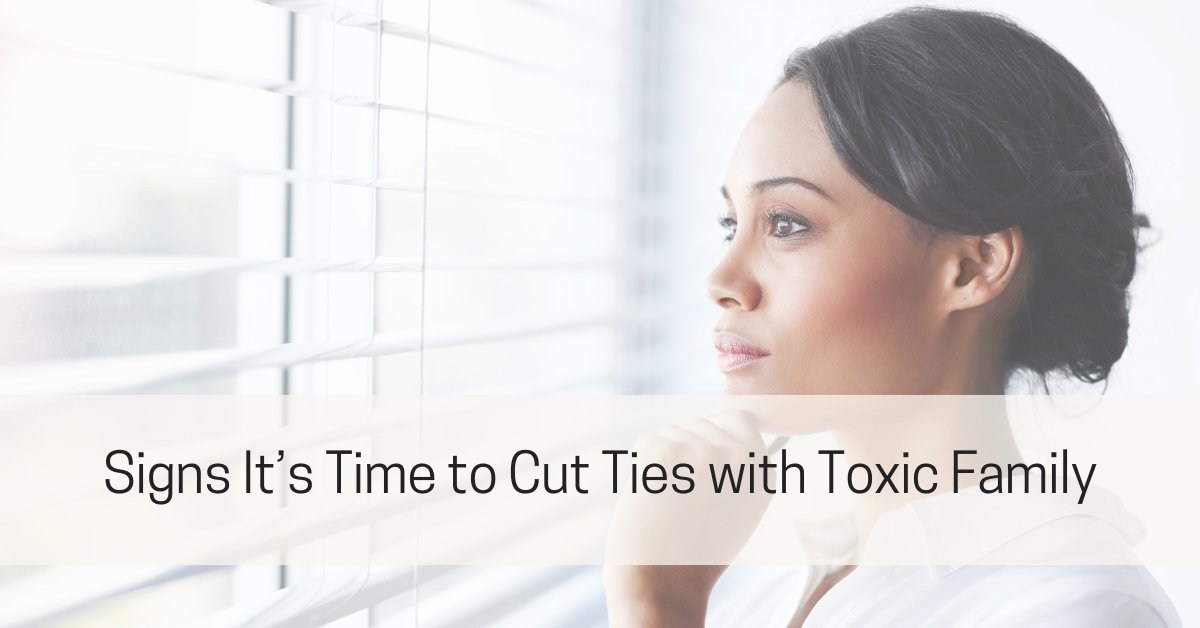How do you know when to cut ties with your family? The bond with our families is supposed to be unbreakable. But the reality is, sometimes, for our own well-being, creating distance becomes necessary.
As a therapist working with adult children of dysfunctional families, I witness firsthand the immense struggle individuals face in grappling with the question: Should I cut ties with my family? Many of my clients are adult children who experienced abuse, emotional neglect, or manipulation in their family of origin. They come to me feeling drained, confused, and questioning whether cutting ties or going “no contact” is the answer.
The decision to create distance, for example, no-contact or low-contact, is deeply personal, and there’s no one-size-fits-all answer. However, understanding the signs of dysfunctional parent-adult-child relationships can help you assess your situation and decide on the best course of action.
Signs of a Dysfunctional or Unhealthy Parent-Adult Child Relationship
- Repeated emotional or psychological harm. This can include verbal abuse, rejection, and invalidation. For example, you’re constantly criticized, called derogatory names, or spoken to in a harsh tone. Sometimes, this is done under the guise of teasing, but it’s intended to be (and is) hurtful. Or family members may gossip or spread rumors about you. And they may sabotage other important relationships, such as those with your partner or children.
- Control and manipulation. Threats, guilt trips, gaslighting, humiliation, and other manipulation tactics are used to keep you in line.
- Repeated boundary violations. For example, your family consistently ignores your need for space, privacy, or different choices, or they refuse to treat you with respect.
- Your values and identities are attacked. For example, your life choices, beliefs, relationships, appearance, and other ways you express your identities are criticized, rejected, or made fun of.
- Lack of accountability and remorse. You’re scapegoated and blamed for all problems and conflicts. The other person denies their hurtful behavior, refuses to change, and will not make a sincere and complete apology.
- Attempts to communicate your needs go unheard. You’ve tried to express your concerns and needs, but your family ignores them or responds with blame, lies, or negativity.
- Negative Feelings. You frequently feel angry, hurt, taken advantage of, or resentful about interactions with your family.
- You dread spending time with your family of origin. For example, you might avoid their calls because they drain your energy or diminish your self-worth. Or you might loathe holidays and family gatherings because a family member makes you feel uncomfortable, anxious, or unsafe.
Should you keep trying to repair the relationship or distance yourself?
When is enough enough? Only you can answer that question for yourself, and everyone needs to make their own decision in their own time. With this in mind, here are some questions to consider when deciding whether to distance yourself or cut ties:
- Harm: How has your family of origin harmed you? Is the harm ongoing? Acknowledging the extent and severity of the harm can be difficult because abusive family members are often skilled at manipulating victims into believing they weren’t abused and that they are the problem rather than the victim. Acknowledging the harm can also be heartbreaking as family members are supposed to care for, not harm each other. However, acknowledging your pain plays an important role in determining the level of distance needed. Be gentle with yourself and seek support during this process.
- Attempts at repair: Have you tried communicating your needs and setting boundaries? Were these attempts met with understanding or further negativity? Have family members acknowledged the harm they’ve caused and made efforts to change and make amends? Are those efforts adequate? This history of repair efforts should inform your decision about whether to distance yourself or attempt to repair the relationship.
- Alternatives to complete estrangement: Have you tried alternatives to complete estrangement, such as limited contact, low-contact, or time-outs? If so, how did they go? Were they helpful? You may need to try different levels of distance to find what’s right for you. Allow yourself the level of distance that you need.
How to Care for Yourself When You’re Experiencing Family Estrangement
Even when you’ve exhausted all options to improve the relationship, distancing yourself from your family of origin can be a difficult decision. Remember, prioritizing your own well-being is not selfish; it’s essential. If your family of origin is a source of ongoing pain and negativity, creating distance can be an act of self-compassion and self-preservation. These tips can help you through this difficult experience:
- Find support. You aren’t alone; family estrangement is more common than most people realize.
- If you’re uncertain about cutting ties with a family member, keep your options open. Going no or low-contact can be permanent but they don’t have to be. It’s very common for family members to have more or less contact at different points in time.
- Know that distancing yourself from a dysfunctional relationship can be instrumental in healing. It’s hard, if not impossible, to heal when you’re routinely being mistreated.
- Sometimes, family estrangement is unavoidable. If you think you’ve been abused or mistreated, you probably have been. I encourage you to trust your gut and remember that abusive family members will work very hard to convince you that you’re the problem and that they haven’t harmed you.
- Start or continue to use grieving and healing practices. These might include therapy, journaling, a support group, and self-help books. It’s healthy to protect yourself and take steps to heal.
- Be kind to yourself. Part of healing is giving yourself the love and care that you didn’t get from your family of origin. You can begin with one of these self-compassion exercises.
- Recognize that distancing yourself from your family is an act of self-love and you are worthy of love and protection.
You deserve to feel safe and loved and to live a life free from harm. If your family of origin is negatively impacting your well-being, consider creating distance as a way to protect your emotional health. Remember, you have the right and responsibility to prioritize your own well-being.
©2024 Dr. Sharon Martin, LCSW. All rights reserved. Photos courtesy of Canva.com.
Watch the Video
More About Family Estrangement
Resources for Adults Who Are Estranged from or Have Low Contact with Family
Publisher: Source link





